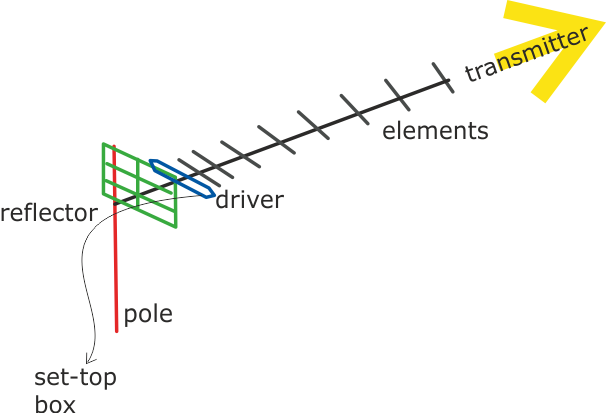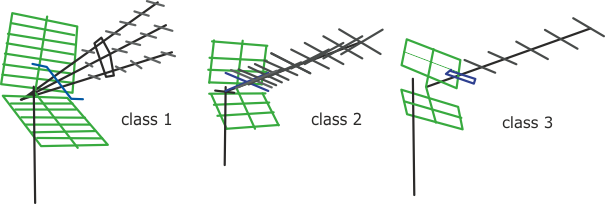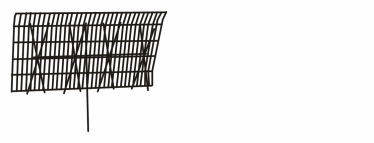Freeview reception - all about aerials
 Brian Butterworth published on UK Free TV
Brian Butterworth published on UK Free TV Updated 8th January 2014.
Your ability of receive all the Freeview transmissions depends on the suitability of aerial
- the design style,
- the "group", and
- its physical location.
Standard type - Yagi aerial

The standard type of TV aerial is known as the Yagi aerial. It is mounted on a pole, and consists of a rod with a reflector (shown green) at the back and many spiky elements (in grey) at the front. The connecting cable connects to the element nearest the reflector, known as the driver (shown in blue).
These Yagi aerials are directional and so pick up signals best from a transmitter that the rod points towards. The more elements the aerial has, the better it picks up a signal and becomes more directional.
A standard-type aerial is all that is required for digital TV reception in most places. These antennae have between 10 and 18 elements and a single reflector. These are recommended for new installations for good digital television reception, but will more often than not function perfectly in good reception areas.
Typically these aerials are designed to receive only some transmission frequencies - see "groups" below.
High Gain aerials

These aerials are designed for poor digital reception areas, and have two reflectors. For maximum signal strength, some digital high gain aerials have up to 100 elements. Since the switchover to digital-only transmissions back in October 2012, most UK households now have good quality digital TV signals.
A more expensive aerial is only required where the signal strength is low, but can often provide the whole Freeview reception where it might otherwise be impossible.
The CAI (that represents aerial installers) has four standards for digital TV aerials. The highest standard "1" is for homes on the fringes of coverage areas, intermediate standard "2" is suitable for use within the coverage area; minimum standard "3" is for good coverage conditions.
These aerials can be either wideband, or receive only selected frequencies - see "groups" below.
Grid

You may haved used a 'Grid aerial' for analogue reception, but as they are generally unsuitable for Freeview reception, they have now generally been replaced by the Yagi type. However in some places a Grid aerial installation may work for Freeview: otherwise replace with a standard Yagi aerial.
Indoor
Indoor aerials are generally not suitable for Freeview reception. In areas of good signal strength it is often possible to receive some transmissions. Even where an aerial works, people often find that may get interruptions to their viewing (or recording).Loft mounted
Loft mounted arrivals are not generally recommended for Freeview reception, as the roof tiles and plumbing will degrade the signal. Some compensation for this loss of signal can be made by using satellite-grade cable to connect the set top box to the aerial.Positioning
The best position for a TV aerial is mounted outdoors, as high from the ground as possible, pointing directly at the transmitter. The signal can be blocked by hills and tall buildings. It should be positioned away from any other aerials.Horizontal or vertical?
The transmitter will either use vertical mode which requires the elements of your aerial to be up-down, or horizontal mode which requires them to be level with the ground.Groups
Both analogue and digital television is transmitted the same group of transmission frequencies (known as channel 21 through to 60). A coloured marking on the aerial shows the group.
To create the best possible analogue picture, TV transmissions from adjacent transmitters have been designated to several different groups of frequencies. By using an aerial that receives only the channels in the correct group, the analogue picture can be kept free from interference.
To receive Freeview transmissions from the same transmitter it has been sometimes necessary to use frequencies that are not part of the transmitter's normal group. When this has occurred, the aerial will need to be replaced with a "wideband" aerial (also known as group W) - one that covers every group.
As Ofcom is planning to move the TV frequencies again - perhaps as soon as 2018 - it may be wise to use a wideband aerial if you can to ensure you can keep viewing Freeview for many years to come.
Help with Television sets?
Thursday, 21 April 2011
T
terry lockett8:42 PM
Crewe
since this area went digital in 2009 we are experiencing loss of signal during the March to May period. This loss of signal occurs most evenings between the times of 8pm and 10pm. we have had a digital outdoor arial fitted, but this does not improve the signal. we also have a mast head amplifier, and an arial booster.
It is most frustrating and we would appreciate any advice you can give us.
| link to this comment |
terry's: mapT's Freeview map terrainT's terrain plot wavesT's frequency data T's Freeview Detailed Coverage
S
Steve9:37 PM
Wrexham
Terry - Do your neighbours have the same experience?
Do you lose ALL channels?
Are there trees in your line of sight?
Have you tried removing your booster?
Might power to your amplifier be lost? Do you know where it come from?
| link to this comment |
Steve's: mapS's Freeview map terrainS's terrain plot wavesS's frequency data S's Freeview Detailed Coverage
Saturday, 23 April 2011
J
Jonny12:14 AM
Hey can anyone help me? I am about to wire my house with tv cable with 8 points throughout, but not sure which type to use. I've heard that satellite cable might be good? I have an existing aerial on the roof that is giving a signal to one room upstairs and the room right below.
Not sure if I can lay the cable in runs in wall and plaster straight over or protect them with conduit. Also how do I split the signal to each room from the aerial. I reckon I don't wire in radial (one off the other) but seperately from a splitter/box?
Basicaly, what's the best way to wire it up?
Also got a digital aerial for the loft spare. Should I use this as well?
What about a booster?
Never done aerial install before but willing to learn!
;0)
| link to this comment |
J
Jonny12:25 AM
... (one off the other) but seperately from a splitter/box?
Basicaly, what's the best way to wire it up?
Also got a digital aerial for the loft spare. Should I use this as well?
What about a booster?
Never done aerial install before but willing to learn!
;0)
| link to this comment |
Jonny: Yes, satellite grade cable. Yes, you can plaster it in. Yes, use a star configuration from a single booster located as close to the aerial.
| link to this comment |
M
Mike2:57 PM
Bedford
I have a new TV with built in freeview that picks up all the channels from the installed arial. I just purchased a PVR that also has built in freeview. When connected I get all the menus working but an message on the screen states no signal? Any ideas?
| link to this comment |
Mike's: mapM's Freeview map terrainM's terrain plot wavesM's frequency data M's Freeview Detailed Coverage
S
Steve3:36 PM
Wrexham
Have you
1) Plugged an aerial into the new box?
2) Done Initial Installation Channel search with the new box?
| link to this comment |
Steve's: mapS's Freeview map terrainS's terrain plot wavesS's frequency data S's Freeview Detailed Coverage
M
Mike3:42 PM
Bedford
TV connected to roof top arial. All OK
TV connected to Virgin + box all OK
TV connected to new PVR only not OK
connected using arial, Scart and HDMi lead - all same issue. Display no siganl. When using the PVR menu get as far as new installation and it locks up.
I don't have a remote for the PVR - but I should be able to do evrything from the PVR box itself?
| link to this comment |
Mike's: mapM's Freeview map terrainM's terrain plot wavesM's frequency data M's Freeview Detailed Coverage
S
Steve4:28 PM
Wrexham
To minimise scope for problems, JUST connect rooftop aerial to PVR input, and PVR to TV with SCART.
If you can then get a PVR Menu displayed on the screen the PVR clearly talks to the TV so you need to do channel selection. Dunno if you can do that without a remote or not. Is it a 2/h PVR? Might be faulty?
Do you have a manual? Can probably download.
And probably buy a remote cheaply. Try any other you can get. My PVR and cheap STB remotes are interchangable, though they are totally different brands.
| link to this comment |
Steve's: mapS's Freeview map terrainS's terrain plot wavesS's frequency data S's Freeview Detailed Coverage
M
Mike4:45 PM
Bedford
OK arial connected to PVR
PVR to TV via Scart
PVR menu comes up
All righ tuntil I want to install first time
menu locks
Screen displays no signal
| link to this comment |
Mike's: mapM's Freeview map terrainM's terrain plot wavesM's frequency data M's Freeview Detailed Coverage
Select more comments
Your comment please!